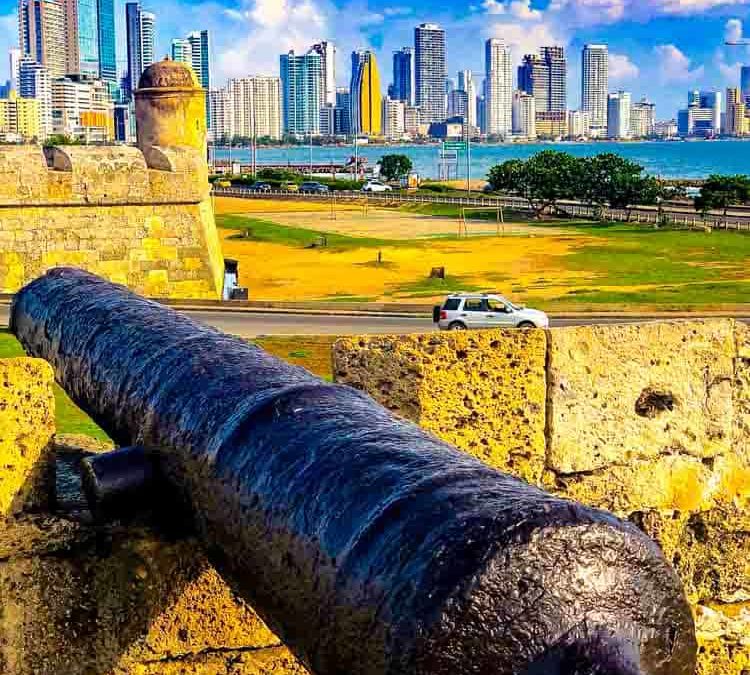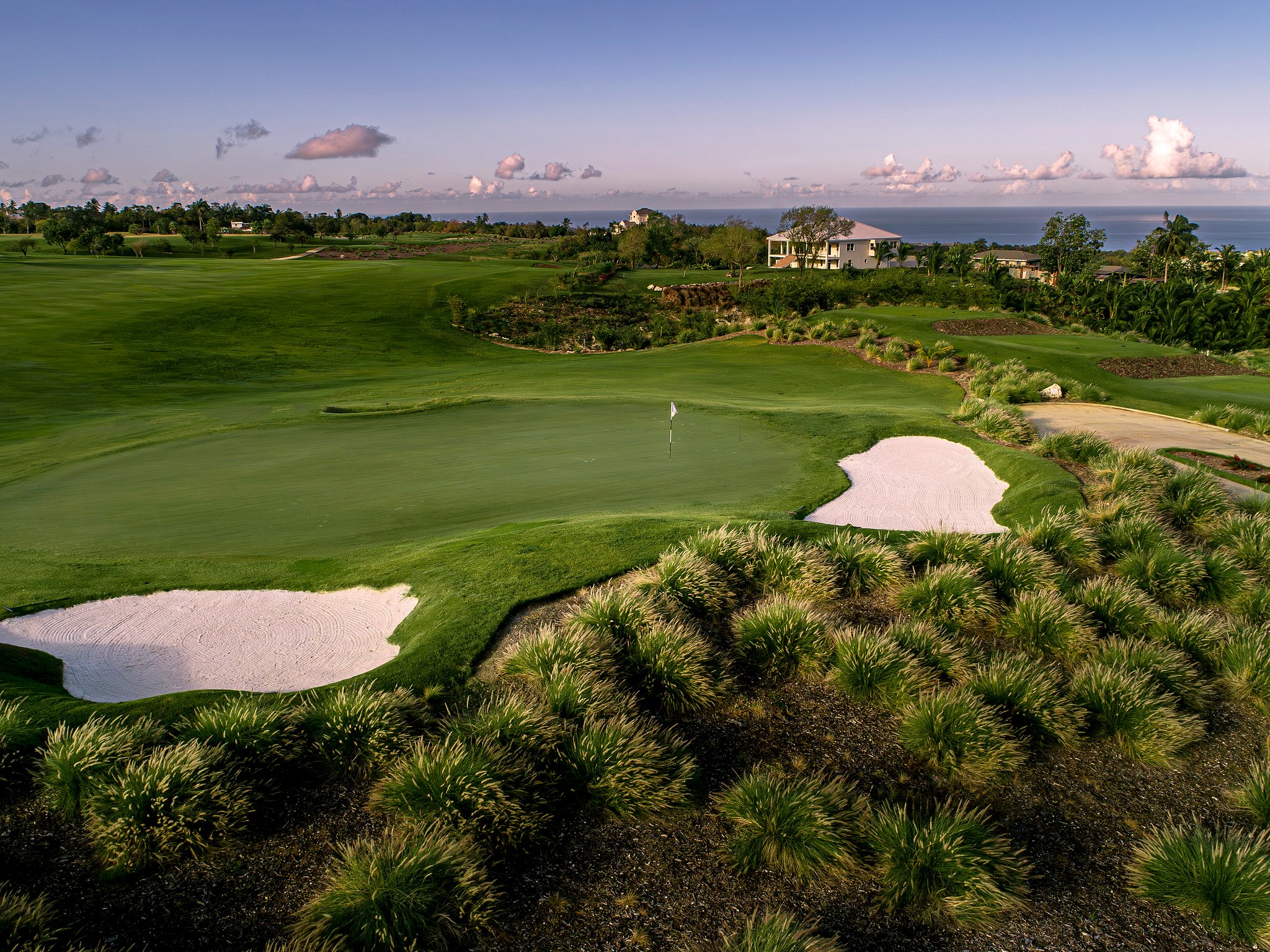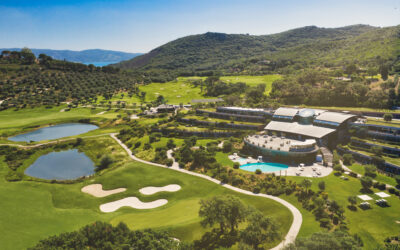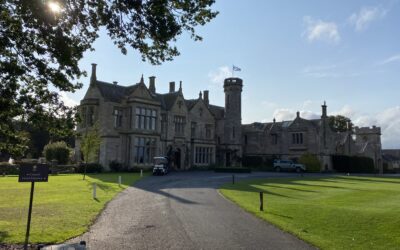Not only does Cartagena, Colombia possess South America’s only TPC golf course fashioned by Nicklaus Design, but I now count Cartagena, Colombia as a “must visit” destination, Here’s what you might expect.
Located on Colombia’s North Caribbean Coast in the Bolivar District, Cartagena is Colombia’s 5th largest city, arguably its most popular travel destination with so many engaging unique qualities and extensive history.

Cartagena is a uniquely delightful mix of the Caribbean, South American, Spanish, and African cultures and quickly brings to mind the best of New Orleans, the Caribbean, Colombian, and even a bit of Africa with beaches and more than 400 years as one of the Western Hemisphere’s most strategic and storied cities. Besides, who doesn’t gravitate to a friendlier mix of folks and urban Caribbean beaches?
The city features two totally different vibes, looks, and experiences with the old Walled City standing in stark contrast to the modernized Boca Grande neighborhood comprised of nightclubs, stores, and luxury hotels reaching towards the sky. Its impressive skyline is reminiscent of Rio de Janero. For what it’s worth, I much preferred the former and suggest you will too. However, wonderful eating opportunities and nightlife with Afro-Latin-Cuban rhythms exist in both areas making for some of the city’s favorite activities.

Proportionally, I’d recommend that you spend three days in the Walled City to include a “walking tour” versus several hours in the modern portion. This old city is truly an impressive fortified places with over nine miles of walls – far larger than I had anticipated!
This fortress was built by the Spaniards over 120 years and helped to establish Cartagena as the colonial capital and military stronghold throughout the colonization period of the 16th, 17th and 18th centuries. The inside is made up of stunning colonial architecture, amazing colors, vibrant shops and restaurants, and narrow cobblestone streets utilized primarily by pedestrians and passing horse drawn carriages. The historic district in conjunction with El Castillo de San Felipe were named UNESCO World Heritage Sites in 1984.

Yes, your taste buds will be excited for your Cartagena stay. Perhaps it is not as daunting a task as attempting to sample all the restaurants in New York City or San Francisco, but it seems as if there are so many options and cuisines in Cartagena. I felt the area to be “The Land of Ceviche” and you could easily do a ceviche tour. All were good, but locals pointed to that at La Cevicheria within the Walled City as the as the Holy Grail of local seafood dishes.
Suffice it to say that the culinary variety of Cartagena is richly diverse and features a fusion cuisine, combining ingredients from its African, Spanish, and Indigenous roots as well as the food brought by Arabic and Spanish immigrants. You will even find Cuban and Italian and, of course, traditional Colombian restaurants as well.

You will often feast on dishes like fish and shellfish accompanied with coconut rice, fried plantain, and salad. The area also boasts a wide range of exotic fruits including sweet coconut, mango, pineapple, papaya, and guava among others which are sold by the palenqueras, the iconic fruit vendors that walk around the streets or beaches carrying a bowl of fruits so gracefully on their heads.

The weather is usually Colombia’s warmest, warm year round with little change due to its proximity to the Equator and the Caribbean. The beaches are the best in Colombia with the bath water temperature of the Caribbean though the color is dark and not crystal clear and blue as elsewhere in the Caribbean. The water is to the West of the City so the sun sets over it.
While water activities such as scuba, sailing, and snorkeling are available, the water is not as clean as it is elsewhere on the Caribbean, due to the city’s somewhat antiquated water treatment infrastructure. Colombia offers world renowned diving at extremely affordable prices, but if you decide to make this a focus of your trip, you would probably be better served to travel to Santa Marta/Taganga, or the Islands of San Andres y Providencia.

There are numerous recommended excursions with boat tours to the Rosario Islands or sunset boat trips around the Cartagena harbor being popular.
Art lovers will want to visit two different spots in Old Town. The Cartagena Museum of Modern Art is located in the former Customs House in the Plaza San Pedro de Claver. It features huge canvases, Technicolor graphics, powerful sculptures, and intricate mixed-media installations by Colombian artists. Secondly, visit the nearby NH Galeria, a glassy, modern gallery stocked with cutting-edge, tongue-in-cheek works by artists who largely hail from Colombia, as well as South America and Europe. And don’t neglect to visit the Getsemani section of the Walled City. Artists’ work populate the sidewalks and walls here in what used to be the impoverished area and is gradually being artfully gentrified.

As with the neighboring communities, the family unit is important element of life in Cartagena as well as Colombia, especially when compared to the more independent types in North America, and the Cartagena natives like to think they are the most friendly and outgoing folks in Colombia.
The Colombian Peso is the official currency, but U.S. dollars are accepted throughout. And while it helps to be able to speak at least a little Spanish, English is spoken at most of the major hotels and many restaurants may have an English translation.

The Cartagena Film Festival, or FICCI, is Latin America’s longest running film festival running every year in March since 1959. The festival draws people from all over Latin America.
Hotel lodging exists in three primary choices – the high-rise chains in the modern section, upscale boutique units in the Walled City. (The Hotel Sofitel Legend is considered by many to be the finest in Colombia.) The third option is the more secluded expansive beach resorts in the countryside just to the North. I quite enjoyed the Conrad Cartagena there during my initial visit.

Though Cartagena is considered very safe, be prepared for some aggressive panhandling. As always, when traveling, it also pays to watch out for pickpockets. At the present, Colombia is challenged by the mass immigration of those fleeing adjacent Venezuela so be cognizant of that. Be advised that prostitution is not uncommon in the early morning hours and police seem to target the tourists who approach them
The airport is on the North end of Cartagena and has been refurbished. You will discover direct flights there from Miami, Ft. Lauderdale, New York, Atlanta, Lima, Panama City, Madrid, Paris, and Amsterdam, along with Bogata, Medellin, and Cali in Colombia. With its growth in tourism, more direct flights are likely.
So there, you have a bit of information to get you acquainted with Cartagena, Colombia. Better yet, visit there!



 0
0









